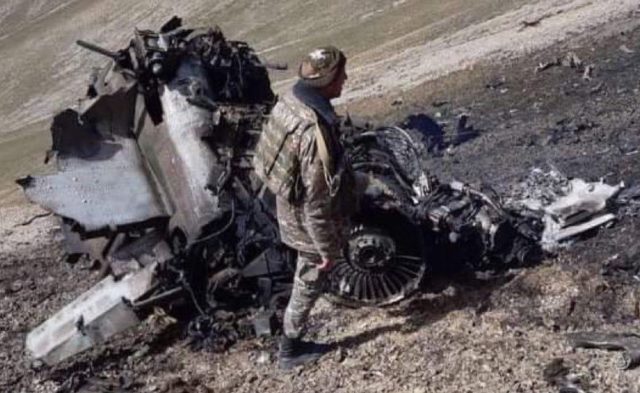
Chechen Minister Voices Support for Azerbaijan in Its Clashes With Armenia
Publication: Eurasia Daily Monitor Volume: 17 Issue: 138
By:

Chechen Healthcare Minister Elkhan Suleymanov has come out in support of Azerbaijan in the latter’s armed conflict with Armenia over Karabakh. Suleymanov wrote on his Instagram account that Azerbaijan, where he was born and grew up, was going through difficult times. “[T]oday, I want to express my words of support for my hometown and country!” the Chechen Republic official declared. Overall public support among Chechens for Azerbaijan is unknown due to the absence of reliable survey data. However, anecdotal evidence suggests that a majority of Chechens side with the easternmost South Caucasus state due to personal connections, trade, and the history of the Russian-Chechen wars during which refugees from Chechnya frequently found safety in Baku (Instagram.com, September 29; Kavkazsky Uzel, October 1).
The note of encouragement from Suleymanov was published on September 29, two days after hostilities between Azerbaijan and Armenia sharply reignited along the Line of Contact in Karabakh. The governor of Chechnya, Ramzan Kadyrov, made a much more balanced statement on September 27, when he called on both sides to stop the bloodshed (T.me/RKadyrov_95, September 27).
Public statements by Chechen officials on the three-decades-long Azerbaijani-Armenian conflict are instructive because they are likely to be calibrated to reflect Moscow’s stance. As a rule, Kadyrov’s pronouncements routinely closely align with the Kremlin’s attitudes toward various domestic as well as international issues; and Chechnya’s leader is the only regional governor who regularly makes public comments on matters of foreign affairs. So far, Russia’s official position on the escalation of the conflict in the South Caucasus has been remarkably muted (see EDM, October 1). The Russian Ministry of Foreign Affairs made a statement on the impermissibility of the transfer of foreign mercenaries to the conflict zone (Mid.ru, September 30). Meanwhile, the co-chairs of the Organization for Security and Cooperation in Europe’s (OSCE) Minsk Group—France, Russia and the United States—called for “an immediate cessation of hostilities and the resumption of substantive negotiations, in good faith and without preconditions” (Osce.org, October 2).
Some observers explain the Kremlin’s rather sluggish reaction by President Vladimir Putin’s dislike for the Armenian leader, Nikol Pashinyan. Prime Minister Pashinyan led revolutionary mass street protests in the spring of 2018 that brought him to power, after which he began prosecuting Russia’s elite allies in the country, including former president Robert Kocharyan (7or.am, July 22). Others point to the increasingly assertive policy of Turkish President Recep Tayyip Erdoğan, which attempts to establish Ankara as a vital player in the South Caucasus, thus eroding Russia’s traditional sway in the region (Vzglyad, October 1). Still, another view is that Moscow’s policy in the region is undergoing a crisis as the delicate balancing between Armenia and Azerbaijan is failing (Business-gazeta.ru, September 30).
Cognizant of or at least sensing Russia’s ambivalent position on the Azerbaijani-Armenian conflict, Chechen authorities appear inclined to side with their federal government. But in doing so, the pro-Moscow authorities in Grozny are ironically following in the footsteps of the pro-independence government of the Chechen Republic of Ichkeria during the 1990s. It bears pointing out that relations between Chechen and Azerbaijani authorities under the first president of Ichkeria, Dzhokhar Dudayev, and the first president of independent Azerbaijan, Abulfaz Elchibey, were especially warm (Day.az, March 16, 2005). Even after Heydar Aliev came to power in Baku in 1993, Chechens remained well regarded in Azerbaijan. Moscow launched the first war against secessionist Chechnya in December 1994, about six months after it brokered a ceasefire between Armenia and Azerbaijan. Many Azerbaijanis felt that Moscow had unfairly supported Yerevan in the conflict and helped it to defeat Baku’s forces. Because of this grudge against Russia, they welcomed the Chechen resistance movement. In August 1996, Russian forces suffered a humiliating defeat by pro-independence Chechen fighters in the battle for Grozny. Soon thereafter, Russians and Chechens signed the Khasavyurt Accord, which ended the war. In 1996–1999, Chechnya existed in a precarious semi-independent state, while its bilateral relations with Azerbaijan expanded. Quasi-independent Ichkeria maintained a representative office in Baku. Chechens freely engaged in business activities in Azerbaijan. However, after the start of the Second Russian-Chechen war, in 1999, support for Chechnya in Azerbaijan was eroded by the Chechens’ employment of terrorist tactics, while Russian-Azerbaijani relations improved (BBC News—Russian service, December 1, 2004).
In fact, the connection between the conflict in Karabakh and Chechnya goes even further back. Chechen field commander Shamil Basayev reportedly fought on the Azerbaijani side in 1991–1992, along with some Russian servicemen (Kavkazsky Uzel, September 7, 2017). In the current political situation, however, there are few prospects for the free movement of fighters from Chechnya to Azerbaijan. As locals point out, Chechen authorities will not do anything without Moscow’s approval (Kavkazsky Uzel, October 1). Chechnya’s ruler, Ramzan Kadyrov, occasionally visits Baku and qualifies his meetings with Azerbaijani President Ilham Aliyev as “brotherly” (Oxu.az, November 28, 2018).
Chechen Healthcare Minister Suleymanov’s blunt recent statement in favor of Baku, thus, appears to signify that the authorities in Grozny have realized there has been a shift in Moscow’s policies toward the conflict in Karabakh, and so they are adjusting their public stance accordingly. It is too early to say what the new equilibrium of power in the South Caucasus will be after the current violence dies down. But the Chechen elites are evidently preparing to take advantage of the change.



